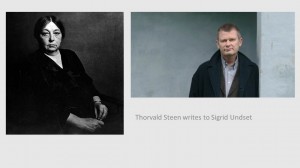The third modern author, Thorvald Steen, gives much more information about his assigned foremother, Sigrid Undset, than Høvring did, throwing in facts and dates that anchor his letter to her life. He imagines visiting Undset in the hospital where she died in 1949, a time-traveller come back to report from the future on matters that may interest her, not least the fate of her own authorship.
Thorvald Steen writes more about Undset’s ethical and political significance than about her fiction. However, he does raise the issue of the fate of the historical novel. He is himself an author of a series of historical novels, and has noticed the common prejudice against the genre from both the fields of literature and history. Undset’s first attempt was rejected by the publisher, whose advice to her (Do not try your hand at historical fiction ever again, you do not have the ability), has been repeatedly quoted since. It must be one of the most ironic mistakes a publisher has ever made, rejecting the future winner of the Nobel Prize, which was awarded for her historical novels about Kristin Lavransdatter. Undset has also been belittled by some male historians, he finds, and it is only down to some important women in Norwegian culture that her authorship has been given the importance it deserves.
Steen is also on an errand to bring up unpleasant or disturbing issues, for both of them, such as the post-war ban on authors with Nazi connections. Why didn’t Undset protest, then, as she had done before, and why do we all so easily accept injustice, even in the best of times? Steen admires Undset’s war efforts greatly, and thinks they are too little recognized. Now, 70 years later, it is rather the work of male authors that is celebrated. American academics, however, think she is the most influential individual in convincing Americans to join the war, with her radio talks, lectures and articles in exile. Steen also writes of her important voice before WWII, in essays and fiction expressing worries about Nazism and racism, and being one of the far too few who helped Jews with money and contacts, when neither the Pope nor the Norwegian state lifted a finger.
It is the disturbing issues of conscience that preoccupy Steen, as they did Undset, and the shared concerns become particularly strong as he reflects on the parallel between her disabled daughter and his own genetic disease, which is gradually crippling him. ‘Hitler would not have let anybody like my daughter, Maren Charlotte, live’, she wrote. Maren Charlotte was mentally disabled, and Sigrid Undset spent the days caring for her and her other children, while writing at night. Steen, as a time traveller, informs Undset that:
‘Unfortunately, our contempt of weakness has not become less. Today, an increasing number of foetuses with different peculiarities are weeded out at an early stage. Some people call it progress.
I myself have a muscular disease that can be discovered during pregnancy. Foetuses with this illness are today legally aborted, Sigrid! I do not apologize for being born. I assume you would say the same of Maren Charlotte?
We are not practicing race hygiene nowadays – but human hygiene. In 1956 and 1973 the Nobel Prize for medicine was given to such advocates.’
Thorvald Steen’s bold voice belied his weakened body. Reading from the wheelchair, he had the authority of a prophet, as he joined forces with Sigrid Undset, fighting the denigration of human beings, sorting them into worthy and unworthy to live. I found it an immensely moving moment, and an apt reminder of the function of the author’s ethical voice in their society, both his own and the voice of Sigrid Undset.
